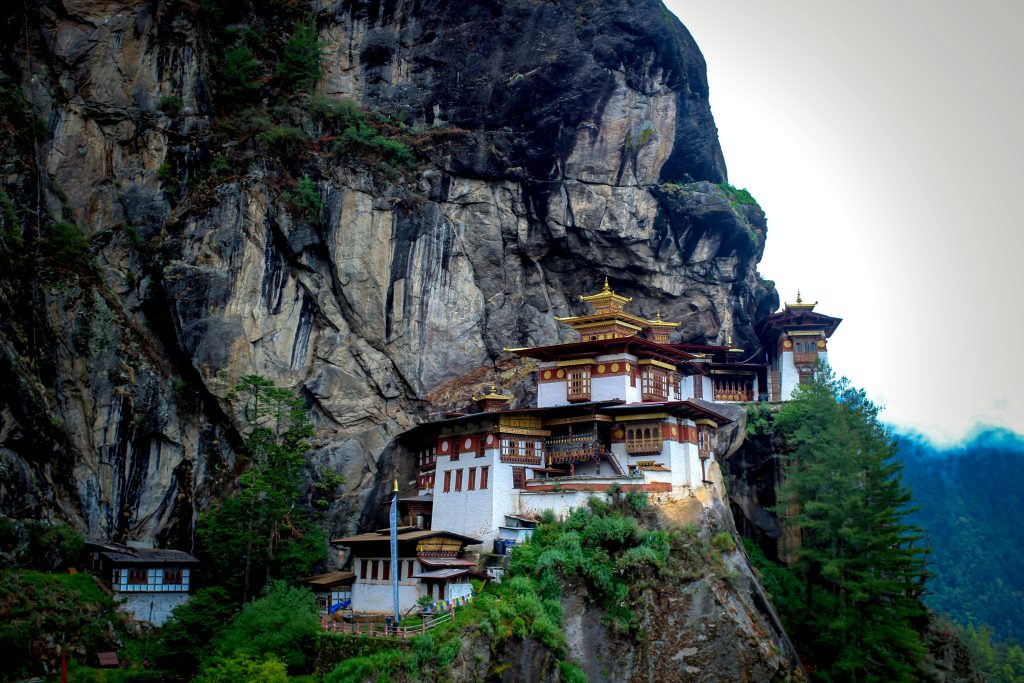
Bhutan, a Buddhist kingdom on the Himalayas’ eastern edge, is known for its monasteries, fortresses and dramatic landscapes that range from subtropical plains to steep mountains and valleys. In the High Himalayas, peaks such as 7,326m Jomolhari are popular trekking destination. Other travel attraction are hike to Tiger’s nest etc.
Buddhist Kingdom: Bhutan, nestled on the eastern edge of the Himalayas, is a devout Buddhist kingdom renowned for its rich spiritual heritage and cultural traditions.
Monasteries and Fortresses: Explore Bhutan’s ancient monasteries, known locally as dzongs, and fortified structures that dot the landscape. These architectural marvels serve as centers of religious and administrative activities, offering insights into Bhutan’s history and craftsmanship.
Dramatic Landscapes: Experience the diverse landscapes of Bhutan, ranging from lush subtropical plains to rugged mountains and deep valleys. Each region boasts its own unique beauty, offering opportunities for exploration and adventure.
Trekking in the High Himalayas: Venture into the High Himalayas to discover breathtaking trekking routes, with peaks like the majestic Jomolhari (7,326m) captivating adventurers from around the world. Trekking in Bhutan provides an unforgettable experience amidst pristine wilderness and panoramic mountain vistas.
Tiger’s Nest Monastery: Embark on a hike to the iconic Tiger’s Nest Monastery, perched precariously on a cliffside overlooking the Paro Valley. This sacred site, also known as Taktsang Palphug Monastery, is one of Bhutan’s most revered pilgrimage destinations, offering spiritual seekers and nature lovers a truly transcendent experience.
Cultural Immersion: Immerse yourself in Bhutan’s vibrant culture and traditions through interactions with local communities, traditional festivals, and handicraft workshops. Experience the warmth and hospitality of the Bhutanese people as you delve into their way of life.
Gross National Happiness: Discover Bhutan’s unique approach to development and well-being, centered around the concept of Gross National Happiness (GNH). Gain insights into Bhutan’s commitment to sustainable development, environmental conservation, and holistic societal progress.
Traditional Cuisine: Indulge in Bhutanese cuisine, characterized by its use of spicy chili peppers, hearty grains, and savory meats. Sample traditional dishes such as ema datshi (chili and cheese stew) and momo (dumplings), and savor the flavors of this gastronomic delight.
Cultural Festivals: Partake in Bhutan’s colorful festivals, known as tshechus, which celebrate religious events and local traditions through vibrant dances, elaborate costumes, and sacred rituals. These festivals offer a glimpse into Bhutan’s spiritual heritage and cultural vibrancy.
Environmental Conservation: Experience Bhutan’s commitment to environmental conservation and sustainability, with policies aimed at preserving its pristine natural environment and biodiversity. Support eco-friendly initiatives and responsible tourism practices to contribute to Bhutan’s conservation efforts.
Altitude Awareness: Bhutan’s diverse landscapes include high altitudes in the Himalayas. Travelers should be aware of potential altitude sickness when ascending to mountainous regions. Gradual acclimatization and staying hydrated are essential precautions.
Permit Requirements: Entry into Bhutan requires obtaining a visa in advance through a registered tour operator. Additionally, permits may be required for certain restricted areas or trekking routes. Ensure all necessary permits are obtained well in advance of your travel dates.
Weather Preparedness: Bhutan experiences varied weather conditions due to its elevation range. Pack appropriate clothing for both warm and cold climates, including layers for temperature fluctuations and waterproof gear for potential rain showers or snowfall, especially in higher elevations.
Cultural Sensitivity: Respect Bhutan’s rich Buddhist heritage and local customs. Dress modestly, particularly when visiting religious sites such as monasteries and temples. Avoid pointing at religious objects or individuals, and ask for permission before taking photographs, especially of locals.
Physical Fitness: Many of Bhutan’s attractions, including the hike to Tiger’s Nest (Taktsang Monastery), involve physical activity and trekking. Assess your fitness level before embarking on such excursions and be prepared for challenging terrain, steep ascents, and long durations of walking or hiking.
Environmental Conservation: Bhutan is renowned for its pristine natural environment and commitment to conservation. Respect local efforts to preserve the ecosystem by disposing of waste responsibly, supporting eco-friendly accommodations and tour operators, and minimizing your environmental footprint during your visit.
